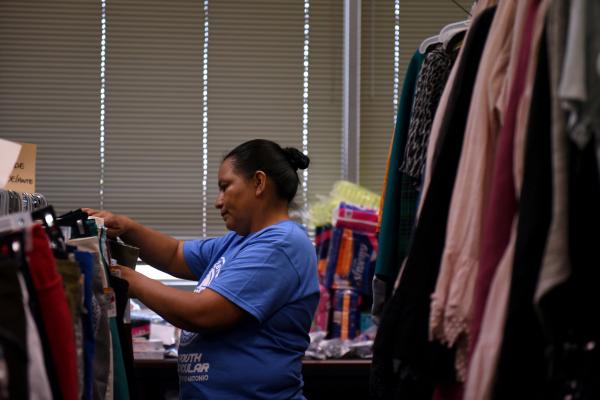In an age where promoting societal goals based on humanitarian principles is becoming increasingly difficult — and more so in political spheres where attempts at garnering votes can make one lose sight of the greater good — it is up to faith-based organizations to mediate between policy makers and the electorate to bridge the gap in refugee aid and resettlement programs.
And this is exactly the role which some faith-based organizations have taken on in the United States.
“The Bible tells us, in numerous places, to care for the foreigner and stranger among us. As those who were once ‘aliens’ from the family of God and have now been given full citizenship through the blood of Christ, we should, of all people advocate for the flourishing and welfare for refugees,” said Elizabeth Bristow, Press Secretary at The Ethics & Religious Liberty Commission of the Southern Baptist Convention. “We should see those settling into our communities, not as obstacles to our flourishing, but people created in the image of God.”
Bristow said the role of the ERLC is to advocate for policies “that balance compassion and rule of law” and to urge church leaders to equip their congregations with the tools to welcome and serve refugees.
In Nogales, Ariz., and across the border, the Kino Border Initiative zooms in on what it means to serve refugee populations out of a faith imperative.
“We think that approaching he realities of migration from a faith perspective is essential for two reasons,” Joanna Williams, the Director of Education and Advocacy at Kino Border Initiative, told Sojourners. “First, because thanks to our faith we can recognize that every person is created in the image and likeness of God and therefore have certain dignity and we must respect their rights.
“Second,” she continued, “Jesus reminds us that when we welcome strangers we are welcoming him. So when we receive migrants, we ought to not only respond to their suffering but also we have the opportunity to grow through contact with Jesus. These realities allow us to accompany migrants more profoundly.”
The Kino Border Initiative has brought together six Catholic organizations “to work with one foot on each side of the Mexico border” in Nogales, Ariz., and Nogales, Sonora, Mexico. The initiative provides humanitarian aid, largely on the Mexico side, legal counseling, and education and advocacy.
The need for its training and education services on asylum came into sharp focus amid the ongoing family separation crisis. Asylum-seeking families crossing the border were detained, and children were taken from their parents — some sent to facilities across the country — while the parents either remained in detention, were released into the U.S. with little information, or deported. Even following a court order to reunite the families, hundreds of children remain separated from their parents and in U.S. custody.
“We believe that the basic building block of any society is the family. When the family is torn apart we are essentially tearing apart society,” Bishop Dwayne Royster, political director for Faith in Action, said.
Faith in Action has called on the federal government to change its policies regarding the separation of families on the border and to immediately reunite them.
“In moments of national xenophobia, it is imperative that faith-based institutions clearly articulate a vision that speaks of the diversity of creation as a blessing,” Royster said via email. “… according to our traditions when a human being is dehumanized and oppressed we are also oppressing the God in whose image they are made and whose spark and spirit reside within.”
According to the Refugee Convention — and to U.S. law — persons who have been persecuted or who fear persecution owing to race, religion, nationality and/or allegiance to a particular social or political group can apply for refugee status or asylum in the United States. Using such laws as its mandate, HIAS, originally formed as the Hebrew Immigrant Aid Society, recently celebrated 130 years of resettling refugees.
“If somebody shows up at our border and asks for asylum, we are required to give that person an opportunity to state their case,” Melanie Nezer, the Senior VP of Public Affairs at HIAS, said.
As part of their resettlement program in the U.S., HIAS assists refugees prior to their arrival by processing the appropriate paperwork, working with overseas Resettlement Support Centers, the State Department's Refugee Processing Center and with the International Organization for Migration — all of which requires extensive communication channels. Once refugees are in the U.S., HIAS works to integrate them into society by providing employment counseling, vocational training, medical care, and English language training.
A number of faith-based organizations, are on the front lines of providing refugee assistance and resettlement services, but the need for their services have plummeted in the U.S., even amid a global refugee crisis.
Two years ago, the U.S. resettled 85,000 refugees; this year, Nezer said, the number is likely to be closer to be around 20,000 refugees.
“The goal for this year was set at 45,000 but no way we are going to resettle that many,” Nezer said.
In addition to lowering the refugee cap, the Trump administration has been using a number of methods — like separating families and detaining people — to deter immigration on all fronts. And in June, Attorney General Jeff Sessions announced the administration would deny asylum to people fleeing domestic violence or gang violence in their home countries.
“These laws haven’t changed,” Nezer said. “But this administration’s policies have changed.”
Admitting refugees from abroad is a program the U.S. historically has had in place because it is in the interest of humanitarian aid and our nation’s foreign policy, Nezer says, “But this administration is not following this because it has different objective.”
Got something to say about what you're reading? We value your feedback!





